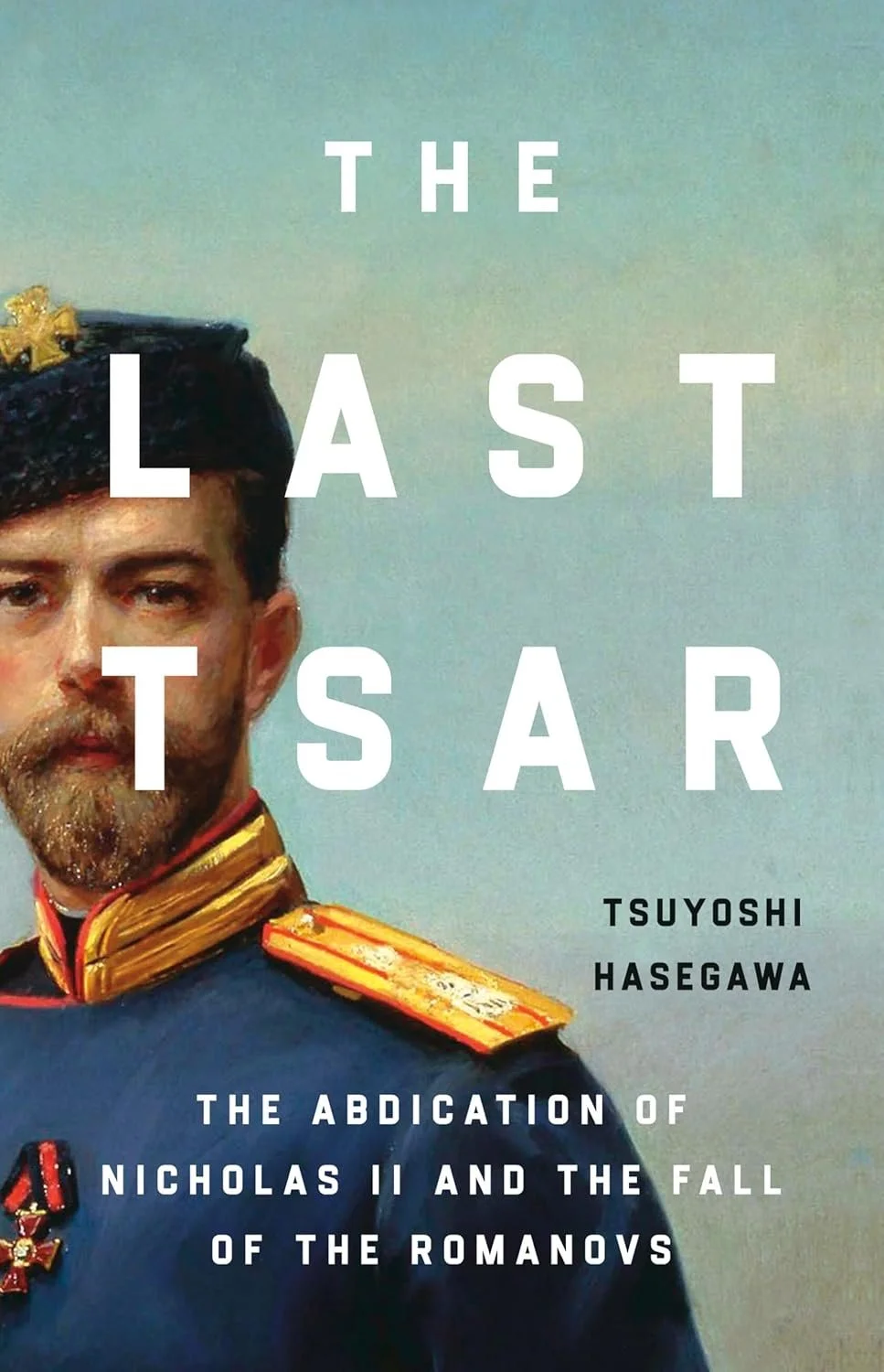The Last Tsar by Tsuyoshi Hasegawa
/The Last Tsar: The Abdication of Nicholas II and the Fall of the Romanovs
By Tsuyoshi Hasegawa
Basic Books 2024
Readers looking for a standard rehash of the doom of the Romanovs, the love affair of Tsar Nicholas II and his German wife Alexandra, the hypnotic spell of their Svengali figure Rasputin, the slaughter of the whole family, faithful servants, and dogs in a Yekaterinburg basement room in 1918, will find both less and more than they’re expecting in The Last Tsar: The Abdication of Nicholas II and the Fall of the Romanovs by Tsuyoshi Hasegawa, professor emeritus in history at the University of California at Santa Barbara. Hasegawa has a refreshingly more nuanced agenda in examining not only how Nicholas II ended a dynasty of three centuries but why any of it happened.
The reflexive answer to that ‘why’ would of course be the intolerance of the Bolshevik revolutionaries who quickly came to see their new order and an ancient hereditary monarchy as completely incompatible. Interestingly, Hasegawa’s narrative isn’t sure of this.
Naturally, the First World War is the book’s first act of what was, for Tsar Nicholas, at least as much a family squabble as it was an international upheaval. “[Minister of Finance Pyotr] Bark recalled that on the day he learned of the Austrian ultimatum,” Hasegawa relates, “Nicholas said that he found it ‘hard to believe that the man who sat in the neighboring room twenty years before when Nicholas and Alexandra became engaged could now deliberately be starting a war which would engulf all Europe.’” The man in the neighboring room was of course Kaiser Wilhelm, the Tsar’s cousin “Willy.”
But even after that war had kicked off, and even after the Russian Revolutions, the fate of Tsar Nicholas and his family remains oddly indeterminate (‘hopeful’ being too strong). As Hasegawa notes, the military officers surrounding the royal family at Mogilev were increasingly professing their allegiance not to Nicholas (and certainly not to “the German woman,” his wife) but to the nation, the fatherland, but even so, our author makes a convincing case that the basic flaw in this change was personal, not institutional: the wrong man was at the head of the state. “Had Nicholas relinquished the duty of governing the state, leaving it to his capable advisers and busying himself with hobbies, Russia would have been much better off,” Hasegawa writes. “He could have been a good constitutional monarch.”
But it wasn’t to be, because Nicholas was almost entirely divorced from the reality of the events gaining momentum all around him. To him, Hasegawa writes, politics couldn’t be separated from his own divinely-appointed person. “He could not accept [abdication] without breaking his sacred obligations to God,” readers are told. “In this conviction, Nicholas and Alexandra were united.”
Alexandra, far more than, for instance, Rasputin, is the villain of the book, but Hasegawa never varies from placing all the blame squarely on the Tsar himself. “Ultimately, every key support for his rule turned against him,” he writes, “and yet the one most to blame for the sputtering finale of a three-hundred-year regime is Nicholas himself – through intransigence, inaction, weakness, stupidity, and, oddly enough, fatherly love.”
Hasegawa writes with an appealingly thoughtful tone only occasionally hampered by cliches (“The Romanovs exited the world-historical stage not with a bang but with a whimper,” for instance, or things coming “to a screeching halt”), and he fills the final act of his book with so many backward glances, so many references to that 300-year track record, that some readers might be eagerly checking the telegraph messages from Yekaterinburg. “Light was seen coming from the tsar’s office for a long time,” reflects one military officer loitering in Mogilev in 1918. “To [him], it seemed as if what he experienced that day, the final day of the 304-year Romanov monarchy, was only a bad dream.”
Bad or good, it’s certainly a recurring dream. But in these pages, the stage lights shift around a bit, the mechanics and sometimes squalid negotiations are unearthed in detail, the personalities (hundreds of them here) stand out in strange and new-feeling perspective, and by the final chapter the story feels more new than it has in years.
Steve Donoghue is a founding editor of Open Letters Monthly. His book criticism has appeared in The Washington Post, The American Conservative, The Spectator, The Wall Street Journal, The National, and the Daily Star. He has written regularly for The Boston Globe, the Vineyard Gazette, and the Christian Science Monitor and is the Books editor of Georgia’s Big Canoe News
